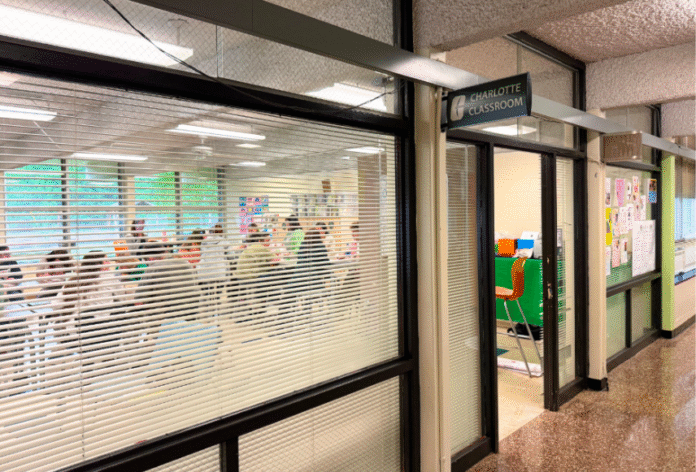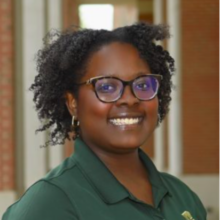“Once a Niner, always a Niner” has never felt more true than it does now, as I wrap up my first year as an educator. I first became a Niner in August of 2020, when I chose to pursue a dual degree in Special Education and Elementary Education at the University of North Carolina at Charlotte. Little did I know that that one decision would lead me to a full circle moment of teaching young Niner’s at Charlotte’s lab school, Niner University Elementary (NUE), as an Exceptional Children’s teacher.
Let’s rewind a bit: My story actually starts at UNC Charlotte as a college student and teacher candidate. During my sophomore year, I had the opportunity to join the NUE cohort. This innovative program placed us, teacher candidates, directly in the school where we took our education courses, learned from professors, and applied that learning in real-time with student — supported every step of the way by clinical educators and faculty.
During the cohort, we participated in LETRS training and delved into the science of reading. This experience ignited my passion for literacy. As a sophomore, I found the LETRS training, along with the understanding and application of the science of reading, to be somewhat intimidating. I vividly recall being asked how I learned to read, to which I replied, “I don’t remember learning to read.” In that moment, I realized just how complex literacy was and the importance of providing high quality instruction.
What’s great about the program I went through is that we didn’t just learn theory — we immediately put everything into practice. We weren’t just attending professional development sessions; instead we had our professors actively engaging with us in the classroom. Immediately after class we transitioned into a classroom with students where we began to apply the principles of the science of reading. Our professors would come in, observe us, and we would have a debriefing session to discuss our strengths and areas for growth, setting personal goals and sharing our feelings about the experience. I was fortunate to engage in this transformative experience for an entire year.
It was at Niner University Elementary where I fell in love with literacy, but also the school and students it served. One afternoon, I had the pleasure of meeting Dr. Washburn, an esteemed professor at UNC Charlotte, who introduced me to the Niner Summer Reading Camp. Intrigued by the program, I recognized it was another opportunity to continue implementing the science of reading and practicing all that amazing work.
During the summer, we worked closely with students from the school year, providing reading and math interventions. I had the opportunity to become trained in many literacy interventions such as Sound Partners, UFLI, Word Connections, and Quick Reads. Throughout the summer program we would implement the interventions and receive coaching. It was really fun because that was another way we were learning the science of reading while implementing it, collecting and using data, and witnessing our students’ growth firsthand. Moreover, it was a rare experience as it was a paid opportunity for college students to practice our passion and field of study.
After that initial summer I was hooked, and continued serving as a Niner Summer Camp teacher for the next few summers. Unexpectedly, I was presented with another opportunity to become a Mebane Early Literacy Scholar. At this point in my journey as a junior in college, I continued as a Mebane Early Literacy Scholar all the way through my senior year, culminating in my graduation in May 2024. This position furthered my commitment to literacy education — not only enhancing my understanding of the science of reading as a teacher, but also allowing me to lend my voice to advocate for the significance of literacy and reading within the broader Charlotte community.
As a Mebane Scholar, I organized family literacy nights at a local Charlotte school and collaborated with peers and faculty to host a screening of the film The Right to Read. Additionally, I played a role in facilitating a panel discussion that brought in speakers to engage with the community on this vital topic. As a first year teacher, I have taken on the role of Mebane Mentor, guiding current Mebane Early Literacy Scholars.
Through the Mebane Early Literacy Program, I transitioned from being a teacher candidate to becoming a leader in literacy, paving the way for a future in education where I will make a meaningful impact.
As an educator, I have come to appreciate the significance of my prior experiences before I even stepped foot into my own classroom. I remember my first day of student teaching, I was talking to my clinical educator. She mentioned her participation in a LETRS training, and I responded with, “Really? I did that!” To my surprise, she exclaimed, “You did that?” I explained that I completed the training during my sophomore year of college. Her astonishment highlighted the unique opportunity I had in gaining early exposure to such essential training.
The true impact of that training became evident once I was in the classroom. I reflected on the extensive training and coursework I had received surrounding literacy, all thanks to UNC Charlotte, the Cato College of Education, the Mebane Early Literacy Center, and all my amazing professors.
Moving into the present, as a teacher, I have been profoundly struck by the transformative power of literacy. As cliche as it may sound, I truly found my “why.” My personal “why” is that I want to ensure all my little Niners develop into skilled and literate individuals. My goal is for my students to leave me equipped to read, comprehend, and effectively communicate through writing — skills that are vital for their future and success in life.
The importance of literacy resonates deeply, particularly when considering broader issues like economic mobility. I want to make sure my students are not just able to read, but they can comprehend what they read, empowering them to articulate their thoughts and ideas through writing and share their voices with the world. Additionally, at Charlotte and the Mebane Early Literacy Center, I have had professors and others in my life who have amplified my voice and have connected me with incredible opportunities, such as participating in a panel for the The Reading League conference and writing this article to share my story.
I am committed to being that same advocate for all of my students — the person who champions and amplifies their voices. My journey reinforces the importance of understanding one’s purpose in education, an important reminder for a teacher: Always remember your why.
As I am writing this, I am currently administering end-of-year assessments with my students. Each day, I apply the science of reading with my first and second graders. My favorite part of this time of year is observing the growth of my students and reflecting on their progress from where they began to where they are now. Witnessing their development in literacy has continually proved to me that the science of reading works.
LETRS is the only thing I’ve ever known for how to teach reading. When it comes to teaching literacy, the science of reading should serve as the guiding framework, regardless of what instructional program is utilized. It is the teachers, through their deep knowledge and implementation of the science of reading, who drive student progress and generate meaningful data. Educational programs and curricula are not a one-size-fits-all approach; therefore, engaging in the science of reading involves building relationships with students, addressing their social-emotional needs, and differentiating instruction effectively.
Ultimately, I consider myself a product of all the amazing efforts and insights imparted by those who came before me. And as always, Go Niners!





